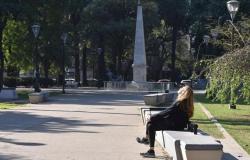Sabrina Edith Gonzales He no longer knows what to do. Since March she has been demanding that the Directorate of Direct Assistance for Special Situations (DADSE) deliver the medication for her son Genaro Yamil Cabrerafour years old. He has mucopolysaccharidosis type 1, a rare disease for which he requires lifelong enzyme treatment. Last year she received it. This year, nothing.
“Between yesterday and today I will have called Dadse ten times. They already cut off my call,” says Sabrina. This Wednesday, with family and neighbors, calls to march from the entrance of Isla Maciel (where he lives) and cut the Nicolás Avellaneda Bridge at 3:00 p.m.. “If they don’t give me the ball, I’ll chain myself to the Obelisk – he warns – I don’t want political flags, I want it to be solved. The claim is to Dadse, to the State, to the new president who took office and cut off my legs with the medication.”
Genaro was diagnosed last year and received the corresponding medication from Dadse. In March he needed to replace vials of laronidase, an imported product. He uses between 12 and 15 every 30 days. It is about 14 million pesos per month. During March and April he obtained them at the Garrahan Hospital, where he is treated. Since then is without treatment.
“There are fewer days of life for him”
The mucopolysaccharidosis type I (MPS I) is a rare disease in which the body lacks or does not have enough of an enzyme that breaks down long chains of sugar molecules. Without that enzyme, glycosaminoglycans build up and damage organs. The treatment is based on receiving these enzymes. Forever. Genaro’s mother knows of only three cases like her son’s in the country.
The medication is expensive, imported and processed by the State. “Dadse always gave them to me. I had the refusal from the Municipality of Avellaneda and the Province of Buenos Aires, with the Garrahan papers, and after 15 days they called me and told me to pick it up at the pharmacy. The last time they gave me 72 blisters,” says Sabrina. “In March I needed it again and they didn’t give me anything. They tell me to call in 15 days. So, until today. This Friday it will be two months since he took medication. In March and April he lent me the Garrahan, but they no longer have them. The days go by and there are fewer days of life for him.”
When Genaro receives treatment, he can lead a normal life. When not, you are at risk. “With the medication he goes to the garden, plays ball, goes to the square, rides a tricycle. Without medication I have to protect him from everything, I don’t even take him out to buy because he is more prone to everything. He catches the flu and it hits him three times as hard as the rest. Garrahan’s family doctor told me ‘I have to tell you everything: without medication he will forget to speak, to tie his shoelaces, to swallow. It’s going backwards.’ I told him I’m not going to come to that. “I am going to move heaven and earth.”
To Justice
Like other patients who complain about their medication, Sabrina prosecuted Genaro’s case. Hand in hand with the Argentine Alliance of Patients (ALAPA), she assists many of the people who deal with the delays of the Dadse. The prosecution must determine the jurisdiction of the jurisdiction. “Last time at Dadse they told me that the papers are ok, that it is under review, that they are waiting for the signature. But “I can’t sit at home waiting for them to give me the OK while my son’s life is going away.”
Sabrina is 41 years old and has four children. Before Genaro’s diagnosis, she lived in Villa Gesell and worked in a real estate company. The disease changed the family’s life. They now live on Maciel Island. The woman works cleaning houses, when she can. “Now I am 24×7 with Genaro.”
“The neighbors support me, they called me from everywhere, people offer me money. But I need the State to ensure my medication,” she asks. Dadse is for patients like Genaro: without social security, with serious or rare illnesses, expensive treatments and difficult accessfor which previous requests to obtain them at the municipal or provincial level have already been exhausted.
From Pettovello to Russo, the absent Dadse
Dadse belonged to the orbit of the former Ministry of Social Development. After the assumption of Javier Milei to the presidency, it was left in the hands of the Ministry of Human Capital, of Sandra Pettovello. That direction was practically paralyzed until February, when it was transferred to the Health portfolio, headed by Mario Russo. At least seven fatalities with interrupted treatment were known from that address, although there is an unofficial estimate that raises that number to 50.
The Ministry of Health told this newspaper last week that 100% of the procedures for oncological and pediatric medications that were delayed when the Dadse was transferred were resolved. There were no details about the rest of the diagnoses or about the cases that began after February, such as that of Genaro.
This Tuesday, Minister Pettovello was summoned to the Health Commission of Deputies to give explanations for the millions of foodstuffs retained in warehouses while the canteens demanded food. He was also expected to speak out about disruptions to drug deliveries. But he missed the appointment.






